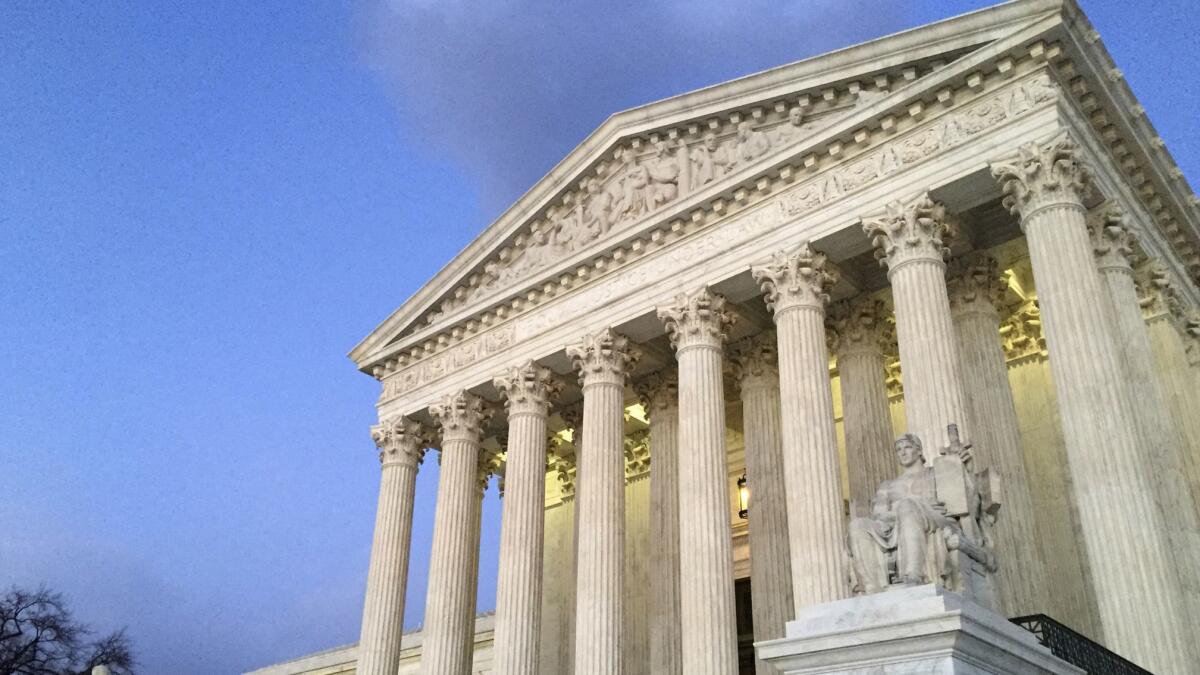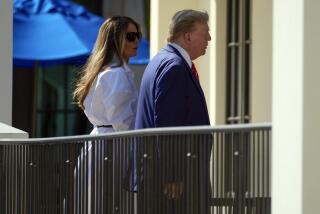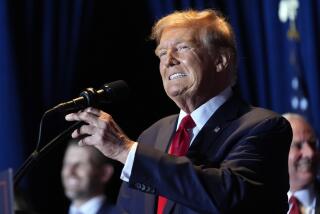President’s hiring and firing power at issue in Supreme Court case over SEC judges

The Supreme Court heard arguments Monday in an arcane dispute over administrative judges that poses a potentially far-reaching question about the president’s power: Can such executive branch officials have independent authority to act or must they be subject to control and removal by the president?
The justices sounded split on how to rule and wary of issuing a broad pronouncement.
Although the case involves only judges at the Securities and Exchange Commission, President Trump’s lawyers urged the court to rule that executive officers must be subject to removal by the president, leading some to see their real target as special counsel Robert S. Mueller III.
Mueller, who is probing possible coordination in the 2016 election between Russia and Trump’s campaign, was appointed under Justice Department regulations that gave him independent authority to bring criminal charges and which say he may be fired by Deputy Atty. Gen. Rod Rosenstein only for “good cause.”
Legal experts have disagreed in recent months over whether Mueller’s independence is protected by law or if the president may fire him, as the White House recently asserted.
Mueller’s name was not mentioned during Monday’s argument, and Deputy Solicitor Gen. Jeffrey Wall made little headway in urging the justices to rule broadly on behalf of presidential power.
“We obviously have urged the court to address the removal issue,” he told the justices. It would “avoid the constitutional concerns” if the justices made clear that executive officers who have significant job-related powers must be subject to being hired and fired at will by top political appointees or the president.
Most of the justices said they were not interested in ruling broadly.
“If I adopt your approach, goodbye to the merit civil service system at the higher levels,” Justice Stephen G. Breyer told him.
“We haven’t said a word about the civil service,” Wall replied. He said he was referring to “high-ranking members of the executive branch” whose positions involve “the exercise of significant discretion.”
Justice Anthony M. Kennedy said the case involves administrative law judges. “Assume that the perception… of fairness and impartiality are enhanced by independence,” he said. Isn’t that a “proper consideration for us in this case?”
Wall said the administration was not trying to take away the judges’ authority to make independent decisions.
Justice Elena Kagan was not persuaded. “There are different ways to interfere with decisional independence,” she said. “One is by a removal power hanging over your head.” The current system assures agency judges “who would have some detachment, some insulation from the political system,” she said.
Only Chief Justice John G. Roberts Jr. spoke up strongly in favor of bringing agency judges under direct political control. “One of the principles that caused the drafters [of the Constitution] to give the authority to appoint officers to the president was the important one of accountability,” he said. “People would know who was responsible.… In this case, you don’t have that. The commission can say: ‘Don’t blame us. We didn’t do it.’ The president can say: ‘Don’t blame me. I didn’t appoint them.’ Instead, it’s something in the administrative bureaucracy which operates as insulation from political accountability.”
The case, Lucia vs. SEC, is the latest chapter in a long-running battle over the structure of the U.S. government. Since the 1930s, the Supreme Court has upheld the principle of independent agencies within the executive branch. But many conservatives adhere to the “unitary executive” theory. They believe the Constitution made the president the chief executive and gave him the power to control executive officials who wield significant authority, including by firing them.
The case arose when Raymond Lucia was accused of misleading investors through promotional seminars called “Buckets of Money.” His case came before an administrative law judge at the SEC. These judges were appointed based on merit and could not be fired except for “good cause.” A judge heard Lucia’s case, decided he had indeed misled investors and imposed a $300,000 fine, which was affirmed by the SEC.
Lucia appealed to the Supreme Court, arguing the process to name administrative judges was unconstitutional because they are not properly appointed by an official chosen by the president.
The court agreed in January to hear his case. Trump administration lawyers raised the stakes in February. Usually, the Justice Department defends federal agencies in the courts, as the Obama administration had done. But U.S. Solicitor Gen. Noel Francisco switched sides and urged the high court to rule against the SEC. Moreover, he said the justices should also rule that executive officers must be subject to “removal,” despite the protections for “good cause.”
“The president’s constitutional authority to faithfully execute the laws requires adequate authority to remove subordinate officers,” he wrote.
Most lawyers who have followed the case think the justices will try to rule without being drawn too deeply into the dispute over the president’s power to fire.
“There didn’t seem much appetite for a broad ruling that would call into question the constitutionality of the appointment of officials throughout the federal government,” Brianne Gorod, counsel for the Constitutional Accountability Center, said after the argument.
On Wednesday, however, Solicitor Gen. Francisco will be back at the court, arguing for the president’s power to bar immigrants from several predominantly Muslim countries.
The justices in December allowed President Trump’s travel ban to take effect, and they are set now to finally decide on its constitutionality.
More stories from David G. Savage »
Twitter: DavidGSavage
More to Read
Get the L.A. Times Politics newsletter
Deeply reported insights into legislation, politics and policy from Sacramento, Washington and beyond. In your inbox three times per week.
You may occasionally receive promotional content from the Los Angeles Times.







